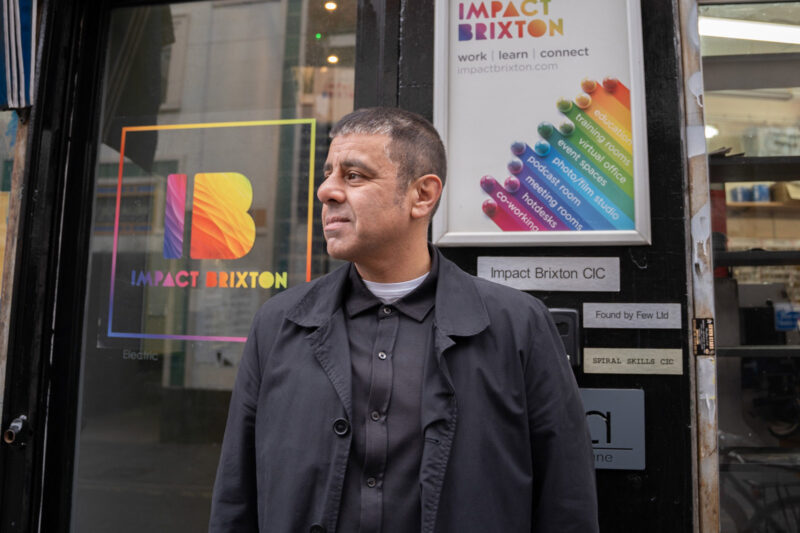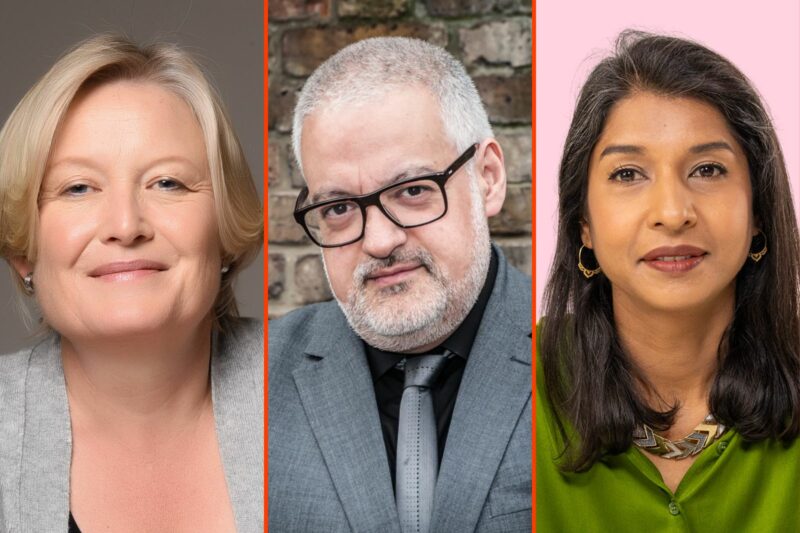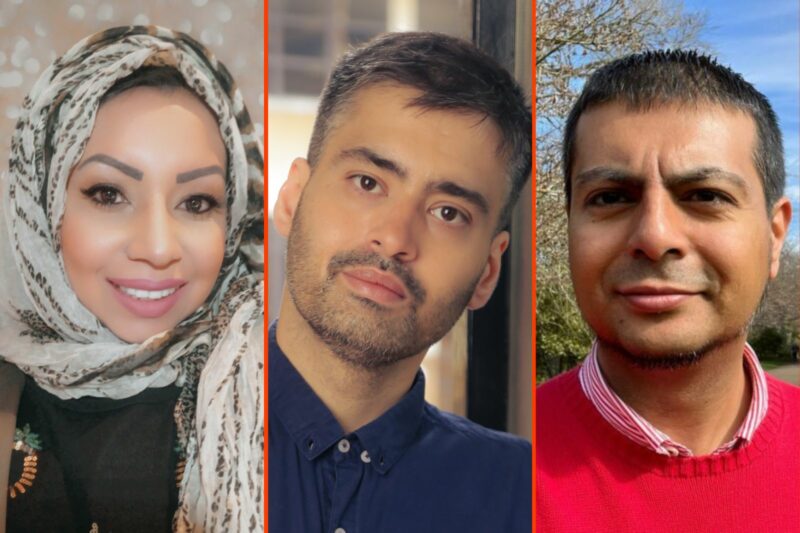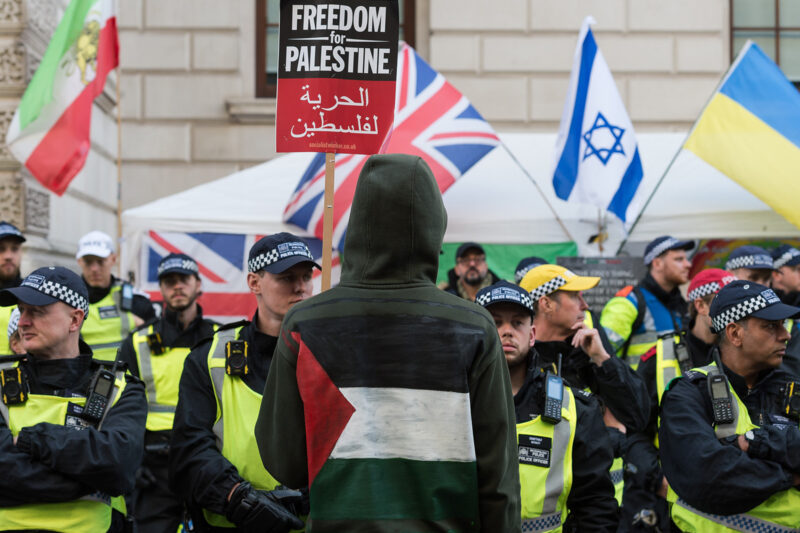How the student occupy movement came back for Palestine
As hundreds of protesters are violently arrested on US college campuses, in the UK students are staging lengthy sit-ins in solidarity with Gaza
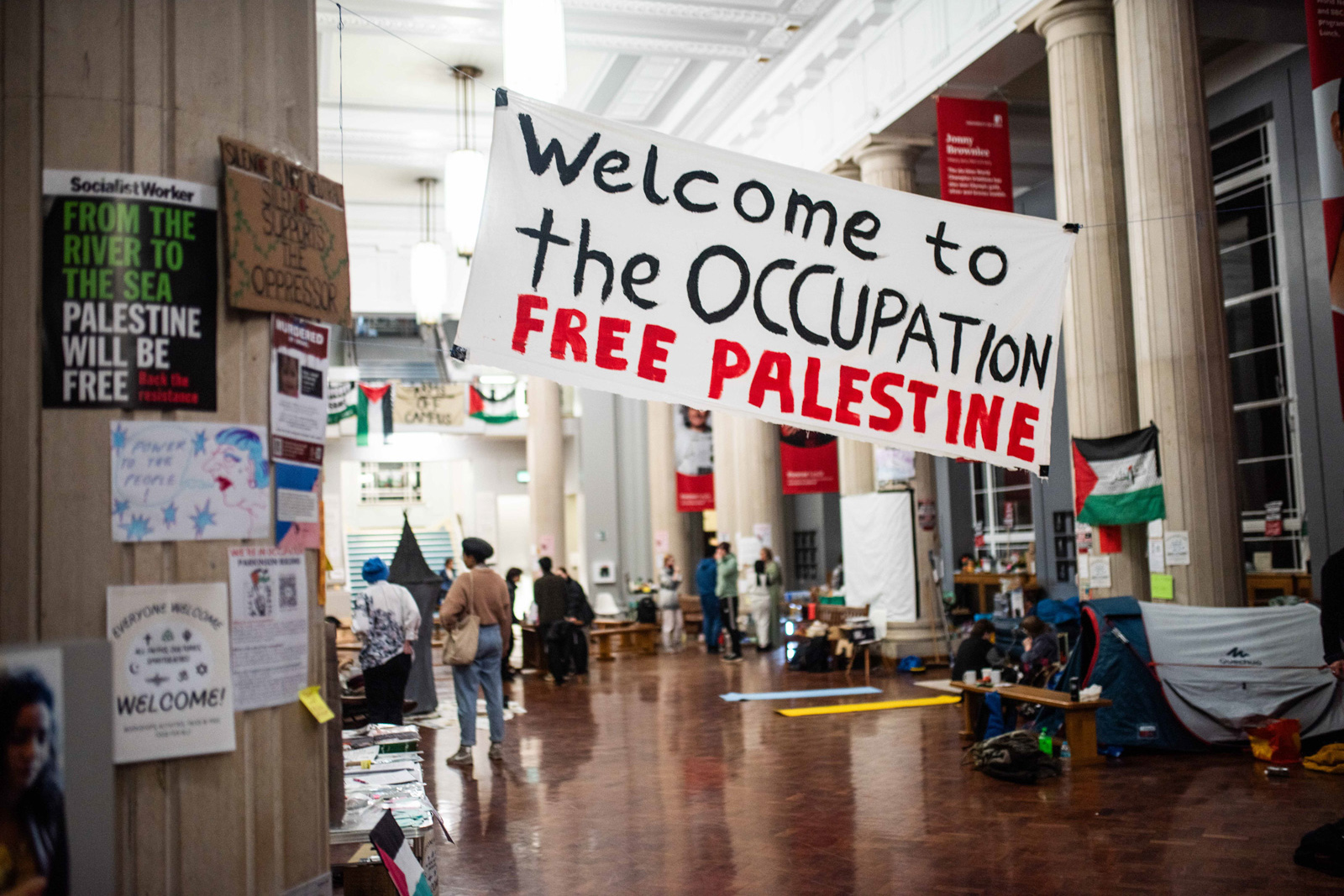
In the early hours of 8 April, around 50 students entered Manchester University’s Roscoe building, a six-floor block used by the science faculty. They put up banners, wrote their demands on whiteboards in place of lecture notes, and started building a makeshift kitchen and screening room. “The first night was a wonderful feeling. We were all sleeping on the floor and there were some bedtime stories,” says Jo, a 20-year-old international student using an assumed name for fear of disciplinary action from the university. “It was just a really nice sense of community.”
Jo had never been allowed to protest in her home country of Saudi Arabia. But soon after witnessing the bombardment of Gaza by Israel, she began organising in support of Palestine. “I decided to go to the protest instead of crying every day watching the videos of people being pulled out from the rubble,” she says.
It was the most recent occupation in a wave across UK universities that started at Goldsmiths, University of London in February. Other students at Bristol, Nottingham, University College London, Leeds and Warwick joined, demanding their institutions divest from arms companies that supply Israel, like BAE Systems, and cut ties with Israeli universities. They called for the revoking of the International Holocaust Remembrance Alliance definition of antisemitism as they say it conflates Judaism and Zionism, and demanded statements of solidarity from the universities, and a protection of students’ right to protest.
Students took over lecture halls and seminar rooms, disrupted open days and organised talks, with Leeds setting a record for the longest occupation in living memory at the university, occupying for 15 days. The demonstrations were largely seen as a success — some demands were met, and campus activism in the UK showed levels of cohesion and organisation that had not been seen in recent years. “It makes sense that all sorts of people are coming together — we’re witnessing a well-documented genocide, and everyone can see it now,” says Jo, whose occupation at Manchester finished after nine days.
Over the past six months, the protests in support of Palestine have seen vast numbers of people come together, including hundreds of thousands who marched in London on 11 November. As the number of those killed by Israel’s war on Gaza passes 34,000, with the state continuing to act with impunity, radical student action is spreading in countries where they feel their governments and institutions are failing.
In recent weeks, the US has seen the start of peaceful protests in universities such as Columbia, New York and Yale. Students have set up tents on campus grounds, begun hunger strikes, and are holding community events in solidarity with Palestinians, calling for ceasefire and divestment. They continued the occupations despite being met with police violence, threats of deportation and calls for the national guard to be brought in. About 1,000 students and staff have been arrested across the US over the past two weeks. On 30 April, police officers in riot gear entered Columbia University and used flashbang grenades to clear protesters from a campus building, arresting nearly 100. Later the same evening, UCLA called in Los Angeles police after clashes on campus between rival protest groups.
This wave of student protests feels different from other recent movements, says Dr Feyzi Ismail, a lecturer in global policy and activism at Goldsmiths. “The student movement around Palestine has been more organised because it follows the pro-Palestine movement in general – those who have organised the mass demonstrations.” She says the scale of the protests suggest activists are “attempting to match the scale of the atrocities taking place”.
Samira Ali, a 24-year-old sociology student at Goldsmiths, was one of the main organisers of the 37-day occupation of the Professor Stuart Hall building in south-east London that began on 20 February. “We marched into the building and said ‘we declare this building shut down, there can’t be business as usual when a genocide is taking place’,” she says. The occupation’s demands included that management issue a statement calling for a ceasefire and commit to assist with the rebuilding of Gazan educational infrastructure.
Five weeks of occupation followed, beginning with the ground floor, and slowly taking over the entire building. Around 30 people took turns to stay overnight, and up to 100 people came into the space to take part in the events and teach-ins. “When we weren’t getting anywhere with management, we just had to escalate our actions. I felt helpless. While I’m sitting in my four walls of university, every university in Gaza is being levelled to the ground,” says Ali.
Far from the stereotypical image of a group of students locking themselves in a lecture hall, the Goldsmiths occupation opened the building to all, welcoming hundreds of people to take part in their events. High-profile activists and journalists including Rahma Zein, Ahmed Shihab-Eldin and Dr Omar Abdel-Mannan gave talks. There were film screenings, community meals, open mic nights, and lectures on the Nakba and decolonisation.
“For a short time we created a special space. We tried to run it as a microcosm of what university should be, with alternative education and battling the structures of governance,” says Ali.
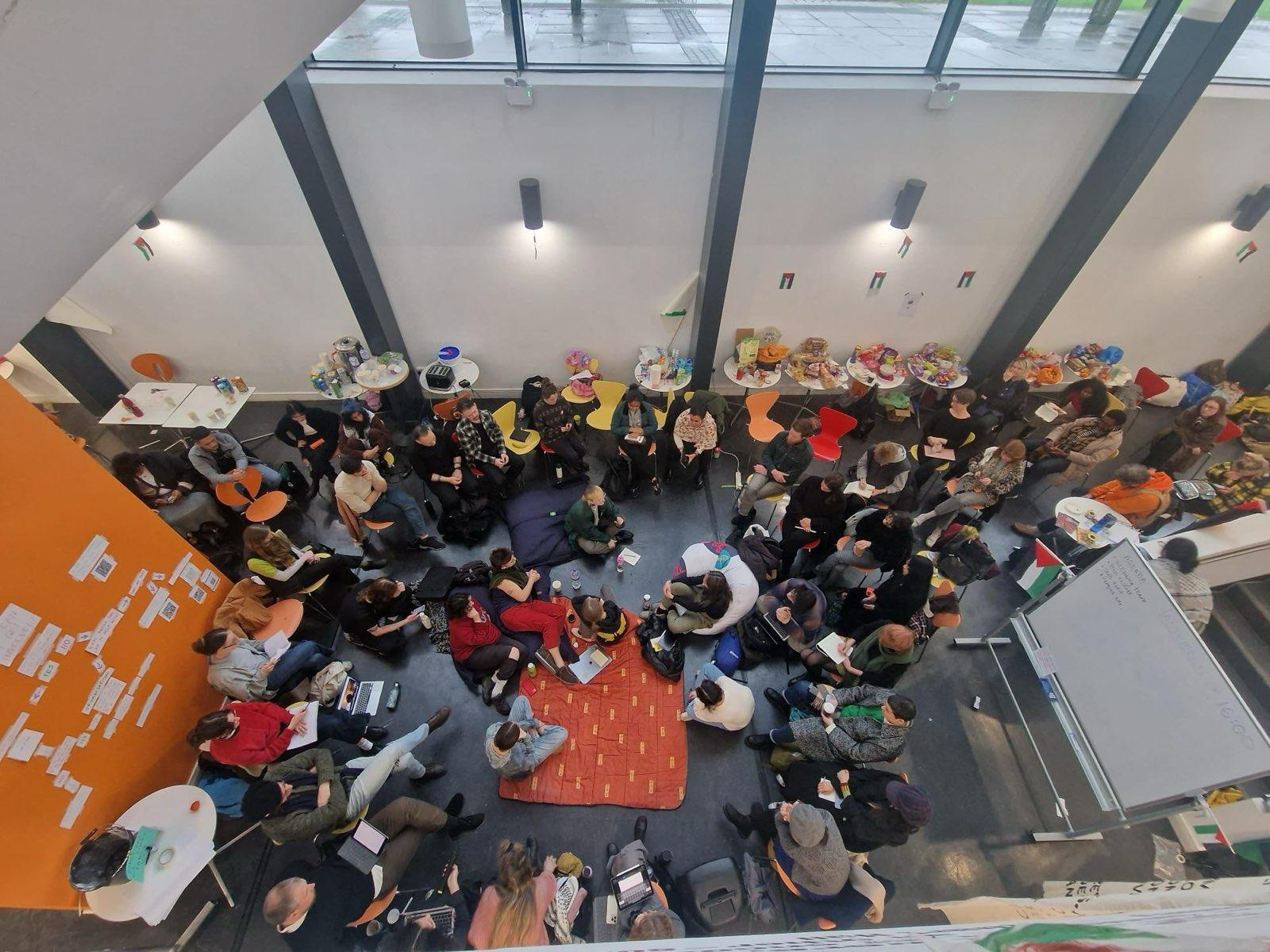
This was a feeling shared across other university occupations across the UK. “The sense of community that we built during the occupation was unlike anything I’ve experienced before,” explains Luffy, a 21-year-old student at Leeds University, who asked to remain anonymous. She took part in the occupation of the university’s main entrance, the Parkinson Building.
“Hundreds of us came together organically and built a community on the principles of peace and liberation,” Luffy adds. Ending on 21 March after 15 days, it was the longest student occupation in the university’s history, according to organisers.
The occupation took place during Ramadan so the students held community iftars and suhoors. “Sneaking to a table quietly to eat with other Muslims and non-Muslims who were fasting in solidarity with us. Simply being in that space and fighting for Palestine, especially in Ramadan, actually increased the love I had for my faith,” says Luffy.
Many occupations, and particularly Goldsmiths’, won support from university staff, something Ali says is very important as “university tactics are always to try and divide students and staff during occupations”.
“When staff take action, management will try to blame it on staff for causing disruption to students,” she says. “It’s the same the other way round, rather than it being that we were causing disruption because of management refusing to meet us.” Many lecturers held classes in situ with the protesters, with teachings related to the fight for Palestine. The occupations also had great support online from the national groups campaigning for Palestine, with food, money, supplies, and bedding being donated by the public and fellow students.
The students at Goldsmiths achieved a set of commitments from the university’s management relating to each of their demands, such as agreeing to release a statement recognising the Palestinian people, or to review the use of the IHRA definition, and so ended the occupation on 27 March. It appeared to be a huge win, but since then, Ali says the university has gone back on some of their promises.
A spokesperson for Goldsmiths told Hyphen: “There was a genuine difference of view over the content of a joint statement, but we remain fully committed to working with Goldsmiths for Palestine over the issues raised by the conflict in order to agree meaningful support that we can put in place for the people of Palestine.”
The Leeds occupation forced university management into negotiations over their demands, while Manchester students were threatened with disciplinary action, and are planning to occupy again in the future.
A University of Manchester spokesperson said they do not comment on actions or investigations regarding individual students, but confirmed that “a student has been subject to a partial suspension which allows them to attend campus for activity directly related to their studies, or access to welfare support”.
For these students, it seems like a page has been turned in campus activism across the country, which they feel has been depoliticised in recent years. “When my mum was at university, student unions were these bastions of social justice. These days, with all the pressures on students with the cost of living, climate change, war and economic crises, it’s harder to be involved,” says Ali. “Universities have been hollowed out with privatisation and neoliberalisation where some student unions aren’t even called unions anymore.”
Ismail believes the 2010 Conservative and Liberal Democrat coalition government fostered this with their policy to reduce spending on university teaching by £3bn a year and increase annual tuition fees to £9,000. “They restructured higher education, for the purposes of both making academics work harder and making students more transactional, as if they are customers being provided a service. That has had the effect of depoliticising the sector.”
Professor Carl Griffin, an international expert on protest history, says the current wave of protests is building on a long tradition of student sit-ins and demonstrations. “The Occupy movement of 2011-12 saw occupations of university classrooms and offices across the globe; in the UK a wave of occupations over the past decade have variously targeted university fees, austerity policies, links to arms manufacturers and oil companies, sustainability policies, and in support of striking university staff.”
While the student protest movement may have been rejuvenated, the pushback has been strong. “The pro-Palestine movement is so demonised,” says Ali, adding that despite this “not being just a Muslim issue”, she has never experienced more Islamophobia than over the past six months, calling out the university and government’s dog whistles when describing the “security threats” around pro-Palestine activism.
“The most obvious misunderstanding has been by this government,” says Ismail, pointing to political figures such as former home secretary Suella Braverman “who called the mass demonstrations ‘hate marches’ and who directly incited violence”.
“The truth is, mass pro-Palestine demonstrations have been incredibly peaceful, with very few arrests, and have brought people together from all sections of society. They have been inspirational — the exact opposite of hate marches.”
These same issues are being felt by the protesters at US universities right now where hundreds are facing arrest.
“Variably police and security staff have been deployed to ‘clear’ occupying students, legal threats made, and students even kicked off their courses,” says Griffin. “So, what we’re witnessing on US campuses is not unprecedented in terms of protest practice, but the rapid escalation is arguable novel in scale, and the use of force something not seen in either the UK or US since the 60s.”
Despite this, the protests have already caused significant disruption after a major donor Robert Kraft pulled funding to Columbia when the university moved classes online for the rest of the year to “de-escalate” tensions.
“The protests at Columbia, Yale and New York University are inspiring other university occupations, and one can only hope that the crackdowns on peaceful protest are resisted, and that solidarity is forthcoming from around the world,” says Ismail.
One thing is clear from all the student occupations, including in the UK: this is only the beginning. Jo says: “We won’t stop until Palestine is free.”
Some names have been changed.
 Newsletter
Newsletter



